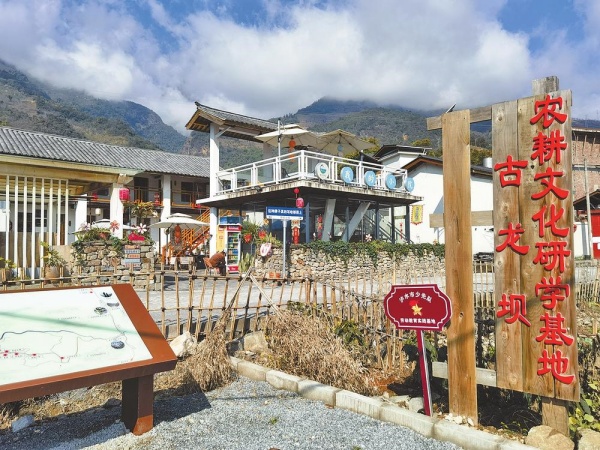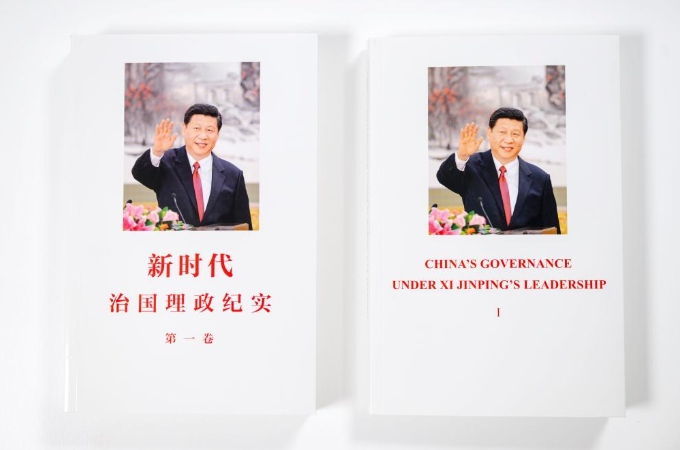Cultural tourism brings vitality to Gulongba Village
Source: InKunming | 2025-03-11 | Editor:Ines
In early spring, the Gulongba villagers' group in Fuba Village, Shangjiang Town, Lushui City, embracing the mountains, is picturesque: the land is vast and open, the houses stand neatly in rows, chickens and ducks play joyfully, and the lush greenery stretches endlessly just like the idyllic paradise described by Tao Yuanming. In the village, tourists come in groups of three or four to enjoy the view and take photos, in a pastoral landscape where humans and nature live in harmony.

Gulongba Agricultural Culture Research Base
At the "Daohuayu Yufu” farmhouse restaurant, chef Chu Xueqin and a dozen waiters are busy at work. "There are a lot of tourists on weekends, and you have to prepare meals for more than a dozen tables every day!" Chu explained. The development of the village as a model for the integration of agriculture, culture and tourism has changed the villages. Many villagers have put down their farming tools and started tourism services like hers, enjoying a more stable income than before.
Gulongba is a small border village with a history of almost a thousand years and only 106 households. In the past, villagers such as Lisu, Bai, Han and Yi made their living from traditional plantations with limited opportunities for prosperity.
In 2023, Lushui City relied on Gulongba's abundant land, water resources and ethnic cultural resources to implement the construction of a "Canyon Water Town, Fish and Rice Township", an agricultural, cultural and tourism integration demonstration village, integrating modern border happy villages, "Ten Million" projects and Beautiful Countryside projects, and create a model project with a water system, a clean vegetable, a Dahua fish, a rice field, a group of guesthouses, two trees in a family and a batch of public support facilities. Promote prosperity through tourism based on agriculture. The Party Committee of Shangjiang Town and the Party Committee of Fuba Village have widely mobilised the masses to participate in housing renovation, network access, farmhouses, tourism service centres and other projects, learn construction, management and tourism service skills, change their ideas and concepts, and enhance their self-development awareness and ability.
"We use the 'work for relief' model to promote the project. With the villagers as the centre, the villagers become the main subjects of project decision-making, construction, operation and beneficiaries." Hu Wenrong, Deputy Secretary of the Party Committee of Fuba Village, said that in more than two years of project construction, more than 100 villagers in Gulongba have worked nearby to learn skills, and many villagers have become tourism service personnel and have a "tourism meal".
Projects such as grading and widening roads, sewage treatment, garbage collection, public toilets, and mountain and rural comprehensive ecological tourism facilities have made Gulongba Village look brand new and become a good place for citizens and tourists to come and go.
Gulongba Tourism Operation is operated and built on the model of "government guidance + village party committee participation + cooperative operation + mass leadership". Since its establishment, it has received more than 20,000 tourists and generated more than 700,000 yuan in revenue. Under the guidance of the Party organization, local villagers have opened agritainment resorts, small shops, barbecue restaurants, raised pigs, chickens and vegetables, served as tourism service personnel, with diversified production and diversified economic sources.
"Daohua Yufu” is a collective enterprise jointly established by the Tongxin Community of Shangjiang Town and the Party Committee of Fuba Village. It is located next to the rippling fish pond and the micro vegetable garden of the Agricultural Culture Research Base. Here, tourists can not only taste the rice and fish dishes, but also participate in leisure activities such as farming, herding and fishing, and experience the fun of rural life and the charm of natural ecology.
"When the resettled people in the community have jobs nearby, the collective economy of the village has a stable source of income. We have also set up a WeChat procurement group for agricultural and secondary products. Every day, the group will post the needed agricultural and non-agricultural products. Villagers will deliver agricultural and side products to restaurants and farmhouses according to their needs, making buying and selling more convenient," said Cao Jingcun, Secretary of the Party committee of Tongxin Township.
Walking into villager Yang Xiaomei's courtyard, the camellia is bright red, the green radish is tender, and the vegetable garden behind the house is full of green. With the booming tourism industry, Yang Xiaomei's vegetable growing area has expanded and her own land is not enough, so she has rented an additional 4 mu of land and her income has been steadily increasing.
"In the past, I had to take vegetables to the Shangjiang Town Government Market or Liuku Street Market, which required a lot of travel expenses and energy. Now, I sell them locally to farmhouses and tourists, and my income has increased a lot. Yang Xiaomei said that when tourists come to the village, the sale of vegetables, Caoguo, nuts, pigs and local chickens in the village has immediately expanded.
"We are planning and building new roads into the village, waterfall viewing trails and barbecue tent camps along the lake. We hope that Gulongba will connect with Lisu Music Town and Spice Industrial Park, develop in a comprehensive way and expand more tourism formats." Hu Wenrong said that the village Party committee will continue to strengthen the leadership of Party building, introduce market entities, widely mobilise the masses, and work together to build a harmonious countryside. By maintaining ethnic unity, protecting border tranquillity, polishing the cultural and tourism brand of "Canyon Water Town-Fish and Rice Town", attracting more tourists to experience the good air and scenery, taste green ecological and good ingredients, and paint a new picture of cultural and tourism development in the new era of border villages.
Click here to view Chinese report
(Editor: Reena, Ines)
You May Like
-
Young Chinese find niche in inbound tourism
Young Chinese have developed new business avenues on the side, such as teaching Chinese, Chinese name-giving and foreign language tour guides, fueled by the gro...
InKunming 2025-02-21 -
Snow tourism turns Erhe into wonderland
On the fourth day of the Year of the Snake, red lanterns adorned a small village in China's northernmost region, drawing thousands of visitors to celebrate Spri...
InKunming 2025-02-05 -
China's Xizang spends heavily on cultural tourism developmen...
Since 2021, Southwest China's Xizang autonomous region has spent 20.16 billion yuan ($2.83 billion) on cultural tourism infrastructure, national park conservati...
InKunming 2024-10-23 -
Cross-border tourism on the right track
New transport option allows travelers the opportunity to view the sights of Laos from the comfort of a high-class train, Yang Feiyue reports.
InKunming 2024-10-14 -
Exploring culture-tourism integration in museums
All this suggests the cultural tourism sector is showing strong recovery, which in turn has accelerated culture-tourism integration.
InKunming 2024-10-12 -
Destination of growth for outbound tourism
After a challenging period, travelers again head for foreign climes.
InKunming 2024-09-20 -
Across China: Historic buildings revitalized with new busine...
In the Pingjiang Road historical and cultural block in Suzhou, east China's Jiangsu Province, tourists are enjoying afternoon tea while savoring the beautiful s...
InKunming 2024-09-09 -
Chinese youngsters embrace more diversified tourism options
China's tourism market is upgrading and becoming a strong source of economic growth. Neo-Chinese style tourism, county tourism, and cultural and immersive exper...
InKunming 2024-05-20 -
Popular dramas boost tourism in filming locations
User viewing time on iQIYI, a leading online entertainment provider in China, increased 12 percent during the May Day holiday year on year, according to data re...
InKunming 2024-05-11 -
Digital audiovisual art fuels China's culture, tourism consu...
The 2023 China Beijing International Audiovisual Conference concluded on Sunday after four days of activities, including the presentation of new technological...
InKunming 2023-08-09







